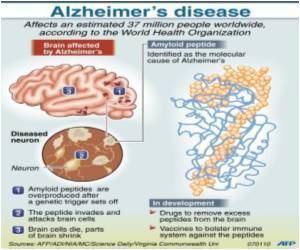
Feinstein has studied the protein called "tau" for about 30 years, using test tube biochemistry and a variety of cultured cells as models. Under normal conditions, tau is found in the long axons of neurons that serve to connect neurons with their targets, often far from the cell body itself. Among tau's major functions is to stabilize microtubules, which are an integral part of the cellular cytoskeleton that is essential for many aspects of neuronal cell structure and function.
It has been known for many years that a small peptide named amyloid beta can cause neuronal cell death and Alzheimer's disease, although the mechanism for how it works has been poorly understood. Recently, genetic evidence has demonstrated that the ability of amyloid beta to kill neurons requires tau; however, what it does to tau has been
Source-Eurekalert












